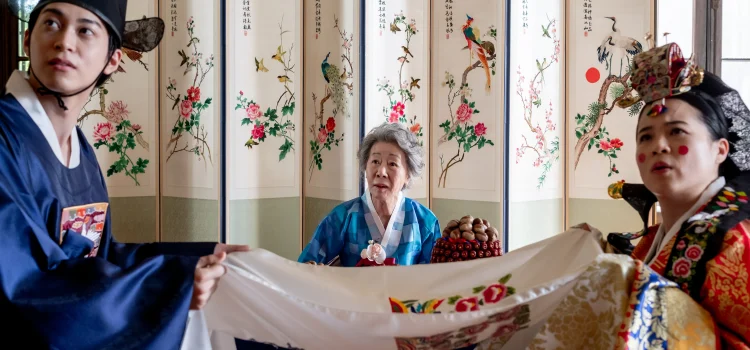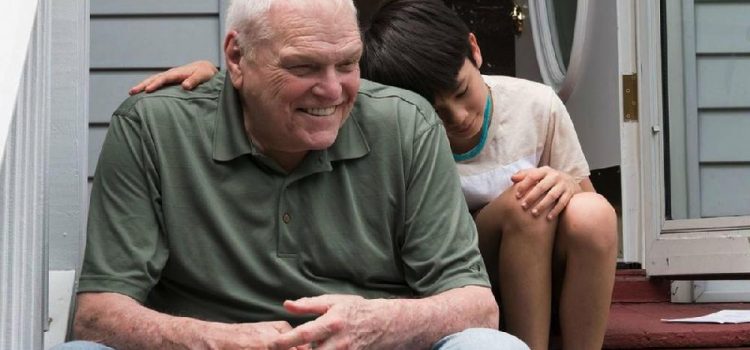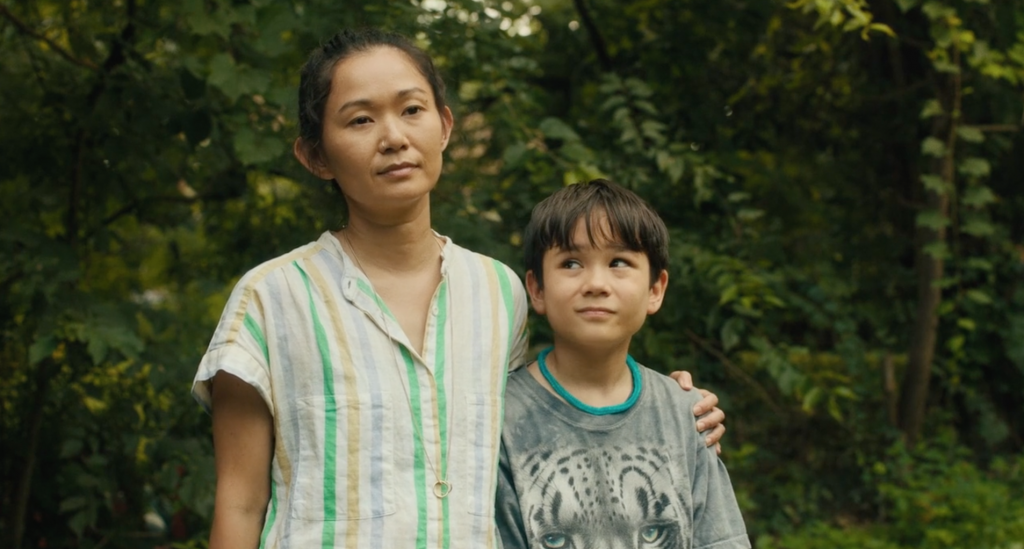By Lynn Venhaus
A modern re-imagining of Ang Lee’s first 1993 breakthrough film, “The Wedding Banquet” is a funny, charming queer family romantic comedy about personal growth, making a home, and your chosen family becoming your real family.
The story is about a gay man (Han-Gi Chan), hoping to stay in the U.S., proposes a green card marriage to a female friend (Kelly Marie Tran) in exchange for paying for her IVF treatment. However, things soon get complicated when his grandmother (Youn Yuh-Jung) surprises them with plans for an extravagant Korean wedding banquet.
It’s safe to say much of society has changed towards more acceptance of same-sex couples in the three decades since Lee and his screenwriter James Schamus imagined a green-card marriage between a gay bride and groom, noting marriage equality and LGBTQ rights achieved since 1993.
This remake has many things it wants to say through writer-director Andrew Ahn, who also teamed up with Shamus for this version. Ahn, an L.A. filmmaker whose previous film “Fire Island” also starred Bowen Yang, was a summer vacation rom com inspired by Jane Austen’s “Pride and Prejudice.”

The cast is all aces-high, with Joan Chen, ‘Minari’ Oscar winner Youn Yuh-Jung, Oscar nominee Lily Gladstone, Emmy nominee Yang, Kelly Maria Tran and newcomer Ha Gi-Chan endearing characters you can relate to through a modern lens.
As the two same-sex couples, Tran, Gladstone, Yang and G-Chan nimbly play complicated Millennials and give us enough genuine emotion to make a connection.
Lee, the Taiwanese filmmaker who has won two Oscars for directing “Brokeback Mountain” and “The Life of Pi,” was considered a legitimate talent after his “The Wedding Banquet” was both Oscar-nominated and won the Golden Bear at the Berlin Film Festival, the first of his two (no one else has achieved that). It was also his first film to release theatrically in the U.S. (Fun fact: He has an undergraduate degree from University of Illinois).
Fast-forward 32 years, and the Ahn-Schamus American remake collaboration still concerns cultural friction and a sham marriage ceremony — only it’s South Korea and not Taiwan as the immigrants’ home country, they’ve shifted the action from New York City to Seattle, and they’ve increased the involved couples from one to two.

Min (Gi-Chan) and Chris (Yang) have been in a five-year relationship and live in the garage of their good friends Angela (Tran) and Lee (Gladstone), who live in Lee’s family home. They would like a child and have tried IVF twice with Lee. Angela doesn’t want to carry the baby, for she has an overbearing mother (Chen), and she frets about what kind of parent she’d be. Chris and Angela became good friends in college.
Min has family money, but his grandmother Ja-Young (Yuh-Jung) is not happy with his reluctance to join the family business – a multinational corporation, and with his student visa about to expire, is making demands.
The pair hatch this scheme — Min will pay for the IVF again if Angela marries him, basically helping both couples — but it becomes more complicated when Min’s grandmother shows up.
As played by the wonderful character actress Youn Yuh-jung, who won an Oscar as the grandmother in “Minari,” Min’s grandmother Ja-Young steals every scene she’s in, and will also break your heart as she reveals confidences to her grandson. After all, Yuh-jung has five decades’ worth of film credits.
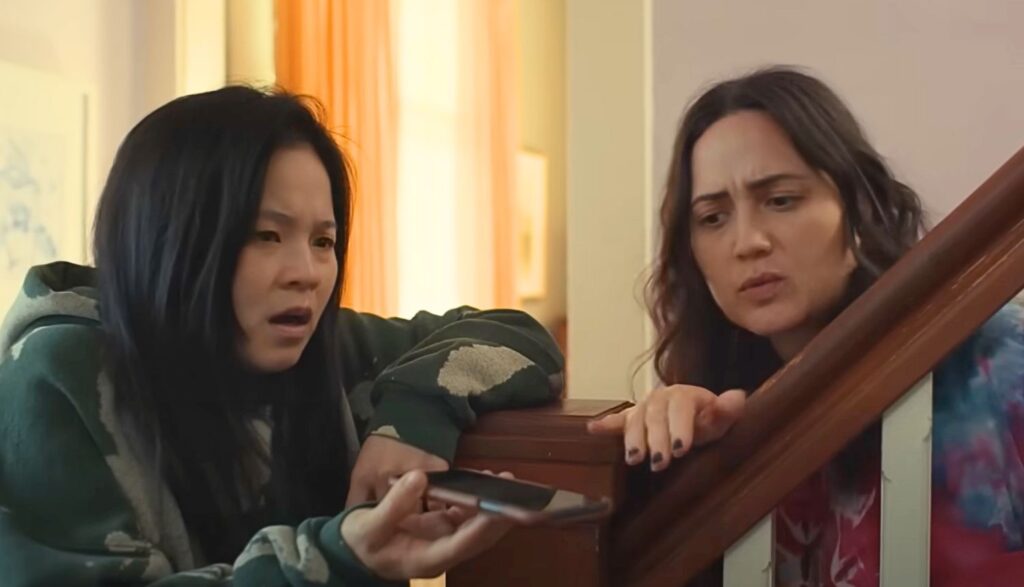
The characters could all easily have been one-note, but the performers provide unexpected layers, while also crowd-pleasing with broad laughs. OK, it may be cliché, but the scene where they “de-queer” the girls’ home is very funny, especially when Yang is shown taking down a framed Lilith Fair poster.
While one can easily predict “all’s well that ends well” after mishaps and complications arise, yet there are some sweet surprises that await.
“The Wedding Banquet” may have some clunky moments, awkward baggage, and appear not svelte enough in its execution, but one can feel its sincerity, its concern over Asian-American representation, and appreciate its lovable cast.
“The Wedding Banquet” is a 2025 romantic comedy directed by Andrew Ahn and starring Kelly Marie Tran, Lily Gladstone, Bowen Yang, Han Gi-Chun, Joan Chen and Youn Yuh-Jung. Its runtime is and it is rated R for language and some sexual material/nudity. It opened in theatres on April 18, became available on premium VOD May 13, and will stream on Paramount + beginning Sept. 8. Lynn’s Grade: B.
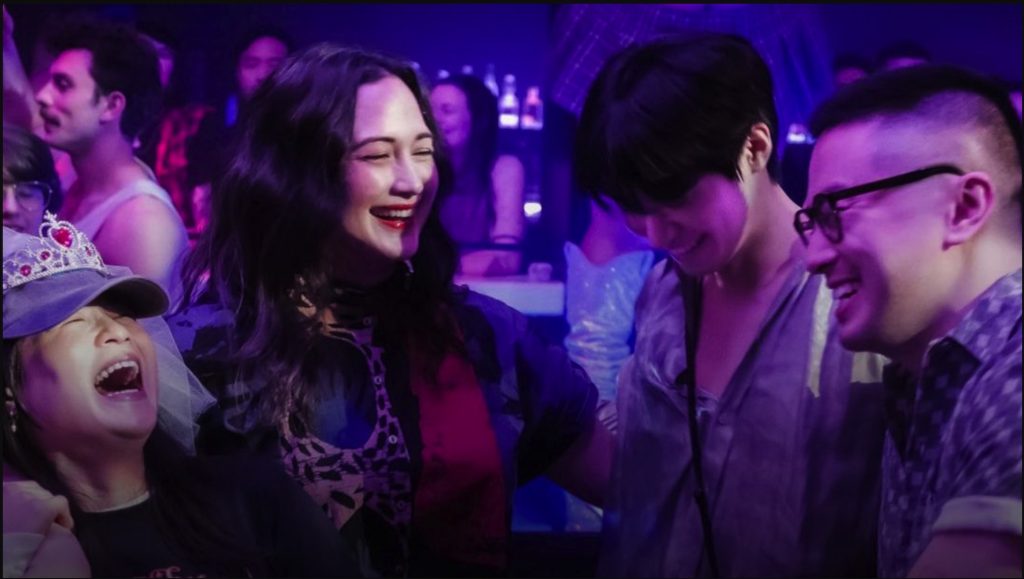

Lynn (Zipfel) Venhaus has had a continuous byline in St. Louis metro region publications since 1978. She writes features and news for Belleville News-Democrat and contributes to St. Louis magazine and other publications.
She is a Rotten Tomatoes-approved film critic, currently reviews films for Webster-Kirkwood Times and KTRS Radio, covers entertainment for PopLifeSTL.com and co-hosts podcast PopLifeSTL.com…Presents.
She is a member of Critics Choice Association, where she serves on the women’s and marketing committees; Alliance of Women Film Journalists; and on the board of the St. Louis Film Critics Association. She is a founding and board member of the St. Louis Theater Circle.
She is retired from teaching journalism/media as an adjunct college instructor.

